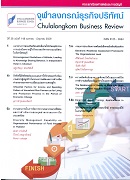ปัจจัยที่มีอิทธิพลต่อแบบแผนการใช้จ่ายของครัวเรือนเกษตรกรผู้ปลูกข้าวในระบบการผลิตและการดำรงชีพท่ามกลางสภาพการเปลี่ยนแปลงทางเศรษฐกิจ
Main Article Content
Abstract
บทคัดย่อ
เกษตรกรผู้ปลูกข้าวเป็นผู้ที่มีบทบาทสำคัญในกระบวนการผลิตข้าว ทั้งนี้ข้าวเป็นอาหารหลักของคนไทยและประชากรโลก อิทธิพลของการเปลี่ยนแปลงทางด้านเศรษฐกิจ ได้ส่งผลกระทบกับเกษตรกรผู้ปลูกข้าวทั้งในระบบการผลิตและระบบการดำรงชีพ ดังนั้นการวิจัยนี้จึงมีจุดมุ่งหมาย (1) เพื่อเปรียบเทียบแนวทางการปรับตัวเพื่อลดรายจ่ายในระบบการผลิตและการดำรงชีพของเกษตรกรผู้ปลูกข้าวจังหวัดอุบลราชธานี ระหว่างกลุ่มที่มีค่าใช้จ่ายต่ำกว่าหรือเท่ากับค่าเฉลี่ยกับกลุ่มที่มีค่าใช้จ่ายสูงกว่าค่าเฉลี่ย และ (2) เพื่อศึกษาปัจจัยที่มีอิทธิพลต่อแบบแผนการใช้จ่ายต่อรายได้รวมของครัวเรือนเกษตรกรผู้ปลูกข้าว จังหวัดอุบลราชธานี กลุ่มตัวอย่างที่ใช้ในการศึกษาคือเกษตรกรผู้ปลูกข้าวจำนวน 384 ราย กำหนดขนาดกลุ่มตัวอย่างโดยการใช้ตารางสำเร็จรูปของ Krejcie และ Morgan สุ่มตัวอย่างโดยอาศัยความน่าจะเป็น ด้วยวิธีการสุ่มอย่างง่าย ระยะเวลาของการศึกษา 12 เดือน เครื่องมือที่ใช้ในการเก็บรวบรวมข้อมูลคือ แบบสอบถาม สถิติที่ใช้คือ ค่าร้อยละ ค่าเฉลี่ย ส่วนเบี่ยงเบนมาตรฐาน ค่า t-test และวิธีการทางเศรษฐมิติโดยใช้แบบจำลองโทบิท ผลการศึกษาพบว่า (1) เกษตรกรผู้ปลูกข้าวมีแนวทางการปรับตัวสำหรับการลดรายจ่ายด้วยวิธีการหาอาหารตามแหล่งอาหารธรรมชาติ อย่างมีนัยสำคัญทางสถิติที่ระดับ 0.01 โดยกลุ่มเกษตรกรที่มีรายจ่ายต่ำกว่าหรือเท่ากับค่าเฉลี่ย มีการปรับตัวด้วยวิธีการหาอาหารจากแหล่งอาหารตามธรรมชาติมากกว่ากลุ่มเกษตรกรที่มีค่าใช้จ่ายสูงกว่าค่าเฉลี่ย และ (2) ปัจจัยที่มีอิทธิพลต่อแบบแผนการใช้จ่ายของครัวเรือนต่อรายได้รวมของครัวเรือนเกษตรกรอย่างมีนัยสำคัญทางสถิติ ประกอบด้วย อายุของหัวหน้าครัวเรือน ตัวแปรหุ่นการจัดทำบัญชีครัวเรือน และรายได้รวมของครัวเรือน อย่างมีนัยสำคัญทางสถิติที่ระดับ 0.05 และ 0.001
คำสำคัญ: แบบแผนการใช้จ่าย; ครัวเรือนเกษตรกรผู้ปลูกข้าว; การปรับตัวในวิถีการผลิตและการดำรงชีพ; การเปลี่ยนแปลงทางเศรษฐกิจ
Abstract
Rice is one of the main foods and sources of nutrition for Thai citizens and much of the world's population. Rice productionin Thailand is important for both home consumption and for export. As globalization influences economics and household rice farmers, this research aims to (1) study the behavior of family attempts to reduce expenditures for living and the production process looking at two groups of Ubon Ratchathani rice farmers: those whose expenditures were less than or equal to the average and the group of farmers whose expenditures were greater than the average and (2) study factors that influence the spending pattern of household rice farmers in making a living. This study took a year and looked at a sample of 384 rice farmers with simple random sampling and a sample size determined using the method of Krejcie and Morgan. The research tools was questionnaires. The collected data was analyzed using frequency, percentage, standard deviation, t-test and the Tobit model. The findings were: (1) in the group where the farmers' expenditures were less than or equal to the average, looking for natural food is what has been done to balance the livelihood with the statistical significance 0.01.To those whose income were lower or equal to the average better adjusted themselves through the above method than those whose income were greater than the average. (2) factors that influence the spending and the total household income consist of age of household, dummy variable of household account, and total income of rice farmer's household with statistical significance 0.05 and 0.001, respectively.
Keywords: pattern of income and spending; household rice farmer; self-adjustment for living and production process
Economic Change
Article Details
Opinions and discussions in papers published by the Creative Business and Sustainability Journal (CBSJ) are deemed as personal opinions and the responsibility of the writers. They are not the opinions or responsibility of the Chulalongkorn Business School of Chulalongkorn University.
Papers, content, information etc. appearing in the Journal are deemed to be the copyright property of the Chulalongkorn Business School of Chulalongkorn University. Anybody or any organization that wishes to publish any part of them or use them in any way must obtain written permission from the Chulalongkorn Business School, Chulalongkorn University.


